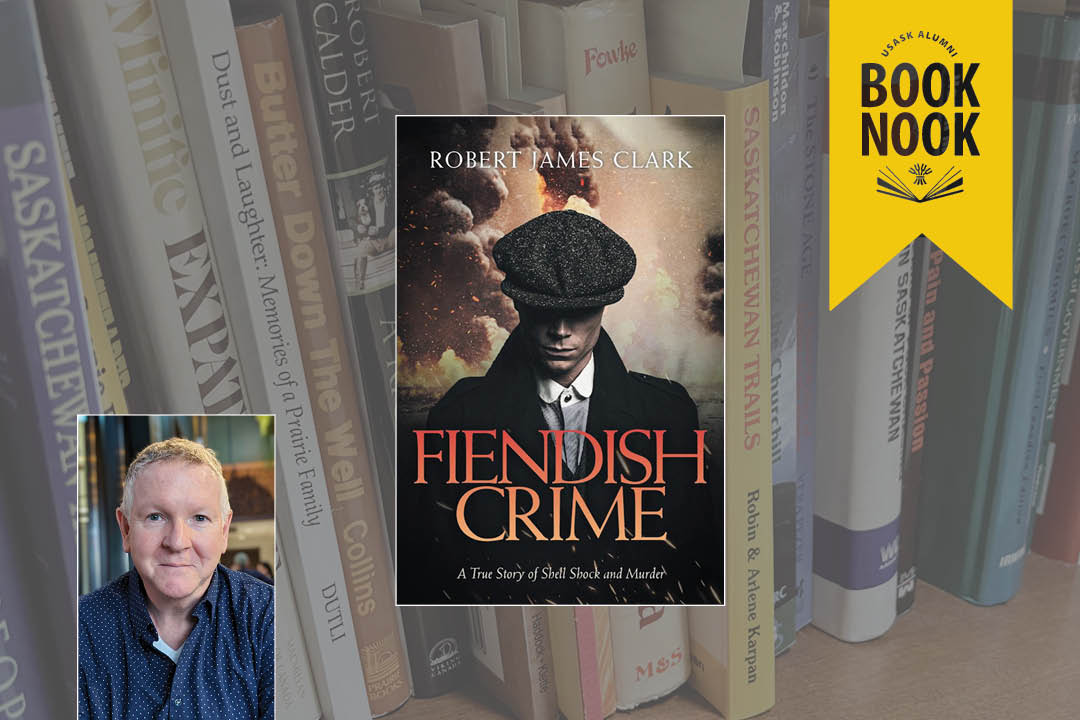
Alumni Book Nook: Robert James Clark (BA’85, ARTS’87)
Robert James Clark is the author of Fiendish Crime: A True Story of Shell Shock and Murder, which he describes as "a gripping and important look at the extended consequences of war"
University of Saskatchewan (USask) graduate Robert James Clark is the author of Fiendish Crime: A True Story of Shell Shock and Murder, which was published in September 2023 by Friesen Press. It chronicles a crime dating back to 1928, when the bodies of two young boys were found in a Chicago shipping canal. A police investigation led to the arrest of their father, George Chisholm, a shell-shocked Canadian veteran of the First World War. The non-fiction book explores this fundamental question: Can George Chisholm be held accountable, given the war trauma he suffered?
Clark, who previously lived in Saskatoon, now lives in Qualicum Beach, on Vancouver Island, since moving there in 2020. Clark was inspired to write his new book because of his memories of his grandfather and because of his interest in the experiences of other WWI soldiers. Clark credits a history class he took at St. Thomas More College at USask with stoking his interest in researching and writing history.
What have you been doing since graduating from USask?
After graduating, I did music studies and eventually returned to USask to take more French courses. I went on to complete a certificate in French-English translation from Université de Saint-Boniface (Manitoba) and to start my own freelance translation business. I’m a member of the professional translation associations of Saskatchewan and British Columbia. All of that involves writing, of course, but this has been my first book.
Why did you want to tell the true story of George Chisholm?
My grandfather was a World War I veteran and I always wondered about his experiences, although by all accounts he never spoke of them. I suspect, like most of those soldiers, he carried the trauma with him until the end of his life, but no one knew what he had gone though. So, when I learned about George Chisholm, another Canadian soldier of that war, who had been shell-shocked and gassed at Vimy Ridge, I wanted to tell his story. He obviously never recovered from his injuries because a decade later, he broke down and committed a double murder. In spite of his “fiendish crime,” I have tried to tell his story non-judgmentally, because I see him as another victim of the war, one of many who fell through the cracks. The effects of war are not always immediately evident; they can persist for generations.
What was it like to research and write this book?
I love history and I enjoy doing research, so I was in my element. I’m in the process of working on a new historical non-fiction book and have just spent a few days at the B.C. Archives, so I’m happy! Like many other things in the past few years, Fiendish Crime began as a kind of COVID project. I learned a lot—not just about the challenges of writing a full-length book, but also about the publication process. I had a lot of help along the way, and I’m grateful for that. That said, there were some days when writing about Chisholm and the murders really took an emotional toll.
What response have you received from readers?
After reading the book, many people have told me that their grandfathers, or someone in their family, also served in World War I and, almost without exception, never talked about it. That’s how horrible the experience was. It’s interesting to me that so many of us have grown up with this looming in our family backgrounds. People seem to respond to George Chisholm’s story, as sad as it is, because it gives them some understanding, at a personal level, of the cost of the war.
Why would you recommend your book to USask alumni?
My book describes the horrible reality experienced by a young Canadian soldier in WWI who believed he was heading for a “great adventure.” Instead, the trauma he faced destroyed his life and the lives of those around him. I think my book is a gripping and important look at the extended consequences of war, which are certainly still relevant in our time.


